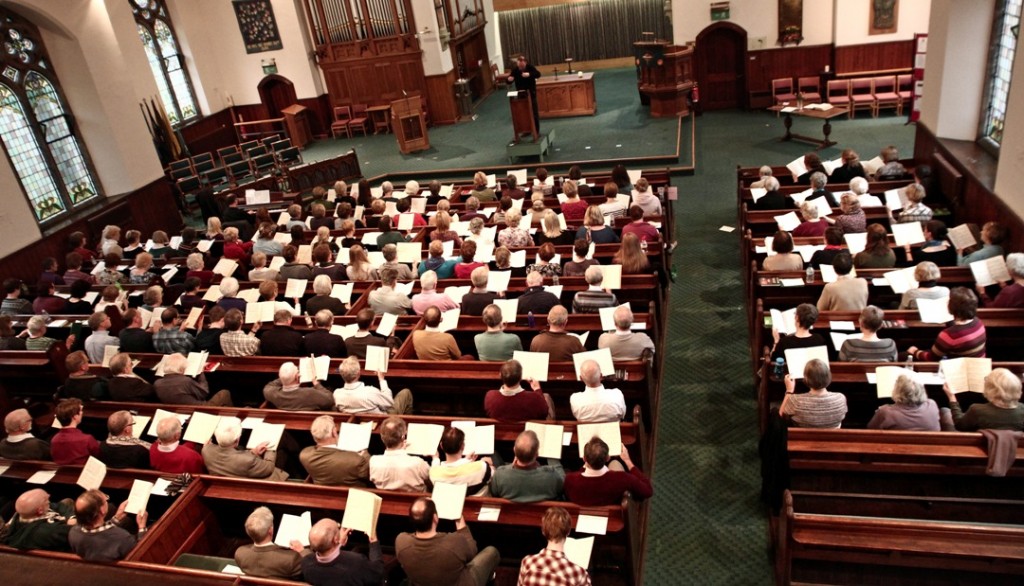I’m halfway through a longish rehearsal break from Bach’s St Matthew Passion – circumstances have conspired so that I won’t be singing it again until mid-November, just a couple of weeks before the concert. It’s never far from my mind though, particularly after the onslaught of thoughts that were stirred up by our Come and Sing workshop a couple of weeks ago.
We sang in English for the workshop, which caused me the odd awkward moment when I launched into German on autopilot (yes, that loud, confident “O Mensch” in the altos was me), or didn’t look properly at the translation and found myself making up my own. Once I’d settled down with it though, I was surprised how much difference it made singing in English, and found myself challenging my prejudices against singing in translation. I speak fairly good German, and I know all the chorales by heart, but singing them in English made me see the words afresh, and when we ran through our condensed performance of the Passion at the end of the day, with Michael Sadgrove reading the Evangelist narrative, I really saw clearly how clever Bach has been with them and what an emotional impact the chorales have. Some of this was already clear – for example, after the disciples have sung their chorus asking “Herr bin ichs?” – Is it I [who will betray you], we all respond through the chorale that follows, basically saying “It is I, I should suffer, you have done nothing”. More poignant is the chorale Was mein Gott will, das gscheh allzeit – O Father, let your will be done – which comes just after Jesus, in his agonised prayers, has accepted his cup of suffering, and singing it feels as we are quietly supporting Jesus as he goes to his trial and death. This chorale caught me unawares at the workshop and I struggled not to cry.
This brings me to the other thing that has been particularly occupying my mind since the workshop, and after a burst of tears at choir practice. How do we perform such emotionally challenging and moving music, and put that feeling across, whilst still being in a fit state to sing? Obviously professional singers must have to deal with this all the time, but sometimes to the extent that the end result is too perfect and cold. I’m getting to know my danger points; I can prepare myself for Erbarme Dich and the following chorale (if you’re coming to our performance, you will need a hanky), or the last two choruses, and try to detach myself, but I know that however much I rehearse, there will still be unexpected moments when the power of Bach’s music sweeps over me and knocks me flat.
Michael Sadgrove, Dean of Durham Cathedral, gave some wonderfully enlightening talks during our workshop. You can read them here on his blog www.deanstalks.blogspot.co.uk but for me, one of the most important things he said was in some comments he made that weren’t in his written text. He told us to think very carefully about how we leave the Passion, that we mustn’t wrench ourselves apart from it suddenly but take the time and space to step gently away. Wise words. The last time I sang the St John, I was carried away, again unexpectedly, by the ecstasy of the final chorale, and it’s become one of those memories that I hold onto tightly, for when I need it. I’m not sure what’s going to happen at the end of Matthew. To me, at the moment, the last chorus, with Christ laid to rest amid tears of grief, seems unbelievably bleak. I have my own, personal, thoughts about it, and at the moment I think it’s going to be a bit tough, but perhaps I’ll be surprised again. Whatever the St Matthew Passion does to me though, I will remember Michael’s words and make sure I take some time to think amid the post-concert excitement and fuss.
That’s all to come though. In the meantime, I have some viciously ranty crowd scenes to learn and tickets to sell. You can also read my official account of the workshop and find out more about our concert on the Durham Singers website.








